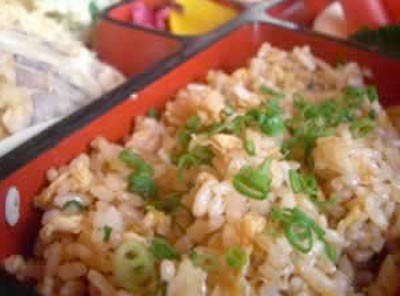(单词翻译:单击)
情景对话
Tom: What did you have for lunch?
汤姆:你午饭吃了什么?
Martin: I had a chicken bento.
马丁:我吃了一份鸡肉便当。
Tom: You brought it from home?
汤姆:你从家里带的便当吗?
Martin: No, I bought it here on campus.
马丁:不是,我在学校里买的。
Tom: In the cafe?
汤姆:从咖啡厅买的吗?
Martin: Yes.
马丁:对。
Tom: How was it?
汤姆:味道怎么样?
Martin: It was ok. It's better than most of the other food here and it wasn't too expensive.
马丁:还不错。比学校里卖的其他食物好吃多了,而且也不贵。
Tom: Do you eat here a lot.
汤姆:你经常在这里吃饭吗?
Martin: I try not to.
马丁:我尽量不在这边吃。
Tom: Why not?
汤姆:为什么?
Martin: It's a little more expensive and the quality isn't quite as good as I'd hope for the value.
马丁:价格有点贵,而且味道也不好,不太值这个价。
Tom: More expensive than where?
汤姆:比什么地方价格贵?
Martin: More expensive than a small restaurant or a specialized chicken place down in town.
马丁:比城镇里的小餐馆和鸡肉店里的价格贵。
Tom: Really? I agree with you about the quality but I thought it was quite cheap up here.
汤姆:真的吗?我也认为味道一般,不过我认为这里的食物非常便宜。
Martin: I just find I can find a little better deal sometimes in town and a lot better quality for about the same price.
马丁:我在城镇里找到了更好的地方,同样的价格可以吃到好吃的多的食物。
Tom: So about lunch, do you have lunch here?
汤姆:你经常在学校吃午饭吗?
Martin: Often? No.
马丁:你是说经常吗?不是。
Tom: What do you do for lunch?
汤姆:你午饭一般吃什么?
Martin: I usually go home and eat. I'm not on campus that often.
马丁:我经常回家吃。我不常在学校里吃午饭。
Tom: Ok, yeah. 'Cause I kind of get stuck up here from morning until evening so I'm eating there everyday.
汤姆:好。因为我一天到晚都待在学校里,所以我每天都在这里吃饭。
Martin: Everyday. Sorry to hear that.
马丁:每天。听到这个我感觉很难过。
Tom: What do you do for dinner, do you cook?
汤姆:晚饭你一般会吃什么?你自己做晚饭吃吗?
Martin: Yes I do, most often, usually just easy beef stir-fries or now and then go out...
马丁:对,我经常做,一般我会做简单的炒牛肉,有时我也出去吃……
Tom: Like chinese-style.
汤姆:中式食物。
Martin: Yeah. Easier to cook than Japanese-style.
马丁:对。比做日式食物要简单。
Tom: Do you shop everyday or do you go shopping once a week.
汤姆:你是每天都去购物,还是一周购物一次?
Martin: I usually shop every other day.
马丁:我基本上每天都购物。
Tom: Ok. So you like fresh food.
汤姆:好,所以你喜欢新鲜的食物?
Martin: Yes.
马丁:对。
Tom: Do you live on your own.
汤姆:你是自己住吗?
Martin: Yes. How about you?
马丁:对,你呢?
Tom: Oh yeah, I live on my own.
汤姆:我也是自己住。
Martin: That's always better sometimes.
马丁:这样有时候很好。
Tom: With my cooking, it's not better that I live on my own.
汤姆:我厨艺不好,所以自己住不太好。

译文属可可原创,仅供学习交流使用,未经许可请勿转载
重点讲解
重点讲解:
1. agree with 同意;赞成;意见一致;
例句:I quite agree with you that he needs further training.
我完全同意你的意见,他还需要进一步培养。
2. kind of 稍微;有几分;有点儿;
例句:She kind of hoped to be invited.
她有点儿希望能受到邀请。
3. now and then 时而;有时;
例句:We go to the opera now and then.
我们偶尔会去看歌剧。
4. on one's own 单独地;独自地;
例句:Tony is planning to strike out on his own.
托尼正在计划开始自行谋生。


